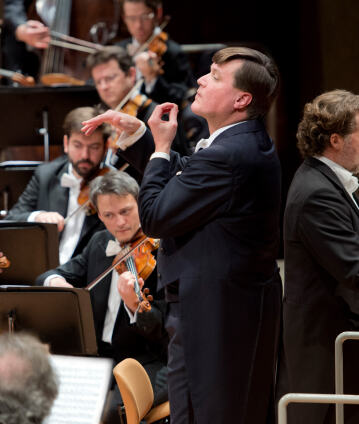Christian Thielemann conducts Brahms’s “Deutsches Requiem”

With the Deutsches Requiem, Johannes Brahms established his reputation as the leading composer of his time. Despite its monumental structure, the work’s message is humane: the focus is not on otherworldly salvation, but rather on temporal solace for the bereaved. The conductor of this performance is Christian Thielemann, an outstanding interpreter of late Romantic music. The soloists are Siobhan Stagg and Christian Gerhaher.
Johannes Brahms’s Deutsches Requiem brought him triumphant success after the complete version premiered in 1869. His many years of experience as a choral conductor and his thorough study of the a cappella movements of old masters benefited him during the composition process. He congenially joins various vocal genres such as fugue, motet, chorale and lied to form a coherent whole. Brahms, the Protestant, addresses the Catholic rite of the requiem with the work. Nonetheless, he did not set the Latin words of the liturgy to music, but rather arranged German texts from the Old and New Testaments. The theme is not otherworldly salvation, but rather temporal solace for the bereaved. He finds a musical language full of dramatic power and touching intimacy for their grief, their pain.
The list of conductors who have conducted Brahms’s masterpiece with the Berliner Philharmoniker since Herbert von Karajan’s death is remarkable: Carlo Maria Giulini, Claudio Abbado, Nikolaus Harnoncourt, Bernard Haitink, Simon Rattle and lastly Donald Runnicles. Christian Thielemann conducts the Deutsches Requiem. He already established that he possesses the right touch for the composer’s choral-symphonic works at concerts with the Berliner Philharmoniker in 2009, where he conducted performances of Nänie, Song of the Fates and the Song of Destiny and received unanimous praise: his interpretations had “intoxicating potential” and a “goose-pimple factor”.
© 2015 Berlin Phil Media GmbH
Related interviews
Artists
Our recommendations
- Murray Perahia and Simon Rattle with Schumann’s Piano Concerto
- Daniel Barenboim conducts Verdi
- Kirill Petrenko conducts Schoenberg
- Daniel Barenboim conducts Elgar’s “The Dream of Gerontius”
- “Pelléas et Mélisande” with Simon Rattle, Christian Gerhaher and Magdalena Kožená
- Kirill Petrenko conducts Mendelssohn’s “Elijah”